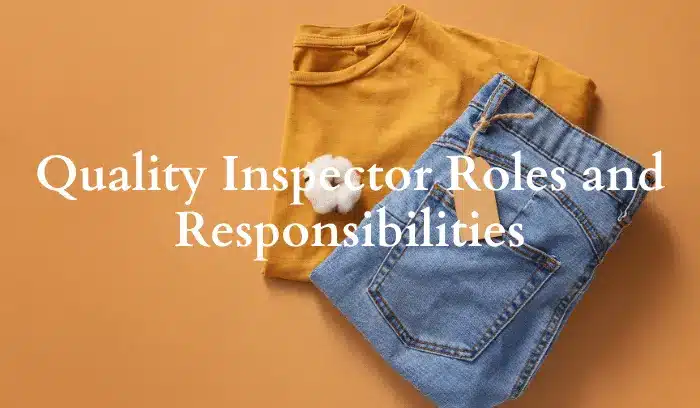Introduction of Quality inspector
Quality inspector roles and responsibilities contribute to maintaining high-quality standards throughout the entire product lifecycle. Quality inspectors are an essential part of the clothing industry. Quality inspector ensuring that products and services meet the required standards and specifications. Their primary responsibility is to verify that the products meet the quality standards. A quality inspector inspector’s roles and responsibilities depend on the industry. Here is a general overview of the quality inspector roles and responsibilities.
Qualifications and Skills Required for Quality Inspector
Education and Training: Quality inspectors typically hold a high school diploma or equivalent. However, additional vocational training or certification in quality control is advantageous. Familiarity with garment production processes and materials is also beneficial.
Attention to Detail: Meticulous attention to detail is a non-negotiable skill for quality inspectors. They must meticulously examine garments for defects, ensuring they meet specified standards and regulatory requirements.
Communication Skills: Communicating inspection results effectively to production teams and management is crucial. Quality inspectors must articulate findings clearly and collaborate with stakeholders to resolve issues efficiently.
Tools and Techniques Used
Visual Inspection: Visual inspection is a primary method quality inspectors use to detect defects such as stitching irregularities, fabric flaws, and color discrepancies. They rely on observational skills to identify imperfections that may impact garment quality.
Measurement Tools: Quality inspectors use various measurement tools, including rulers, tape measures, and gauges, to verify dimensional accuracy and consistency. Precise measurements are essential for ensuring garments fit properly and meet size specifications.
Defect Classification: Inspectors classify defects based on severity and impact on garment quality. This helps prioritize issues for corrective action and facilitates communication between production teams and management.
Importance of Quality Assurance in Garment Manufacturing
The importance of quality assurance to garment manufacturing companies cannot be overstated.
Customer Satisfaction: High-quality garments lead to satisfied customers who become repeat buyers and brand advocates. thats meet customer expectations enhances brand loyalty and reputation.
Brand Reputation: Quality issues can tarnish a brand’s reputation and erode consumer trust. By prioritizing quality assurance, garment manufacturers safeguard their brand reputation.

Quality Inspector Roles and Responsibilities
Daily Functions
- Ensure all quality systems and procedures are functioning correctly.
- Performs complete layout inspection by measuring dimensions, such as length, height, and distance, between reference points, using precision instruments to ensure the product meets specifications.
- Ensure measurement, trims, sewing, and color swatches are according to the buyer’s standard and available in every sewing line for easy reference.
- Check the pilot run and 1st output all details against the sample comments from the buyer, pre-production meeting, and technical files.
- Follow-up alteration in sewing production.
- Visually compares workpieces against one another to assess/defect manufacturing variations in the process.
- Maintain discipline and keep a good working environment in printing.
- Maintain good & frequent efficiency.
- Maintains records of inspections and prepares a list of defects.
- Keep approved sample & check pattern for easy checking.
- Keep measurement sheet & trims card for easy reference to ensure buyer standard.
- Pay attention to defect percentage & use separate boxes for pass, recovery & reject.
- Communication with the operator.
Monthly Functions
- Monitoring the quality issues of their allocated post.
- Develop a harmonious working relationship with another department to prevent quality problems.
- Responsible for accuracy and timely inspection/calibration of monitoring and measuring devices.
Other Regular Functions
- Continuous improvement on quality system & procedures.
- Support the department objectives to continuously improve its quality system and procedures and zero chargeback from customers.
Yearly Functions
- Follow up Annual performance appraisal for all company employees of the quality department.
- Keep up with standards, regulations/laws, issues, and news concerning product quality.
Key Performance Indicators for Quality Inspectors (KPIs)
- Report upfront to the supervisor and in-charge about findings during the pilot run and bulk production.
- Update the rejected reports as per buyer, style, color & size for replacement of the rejected garments.
- Attention to DHU reports & line & end line inspection.
- Complete and submit quality control reports accurately, on time, and by the established procedures.
- Review all the reports to see if they correspond to the actual results.
- Maintained good efficiency.
Conclusion
Quality inspectors important role in ensuring that garments meet quality standards and regulatory requirements in the competitive garment industry. It’s imperative to note that the quality inspector roles and responsibilities are based on the industry; the level of responsibility may vary depending on the organizational structure and the inspector’s experience and expertise.
Also Read:
GPQ Job Responsibilities In Garments Industry: Full Overview
AQL Chart in Garment Industry-Acceptable Quality Level
FAQs (Frequently Asked Questions)
What are the 5 responsibilities of quality control?
The five responsibilities of quality control typically include:
1. Inspecting Products
2. Monitoring Production Processes
3. Implementing Quality Standards
4. Documenting Quality Data
5. Continuous Improvement
What is the role of quality inspector?
Quality inspector ensuring that products and services meet the required standards and specifications. Their primary responsibility is to verify that the products meet the quality standards.
What is the role of a QA QC inspector?
QA QC inspector is responsible for ensuring that products or services meet quality standards and specifications. This involves conducting inspections, performing tests, and monitoring production processes to identify and address any issues that may affect quality. Additionally, QA QC inspectors play a key role in maintaining documentation, implementing quality control procedures, and driving continuous improvement efforts within an organization.


